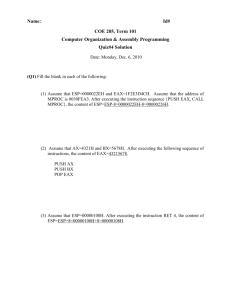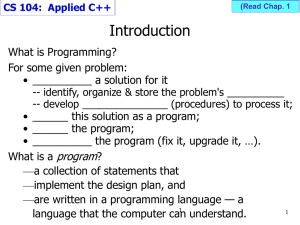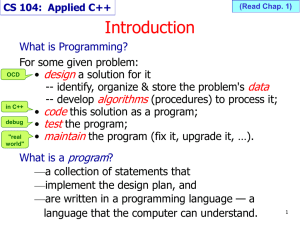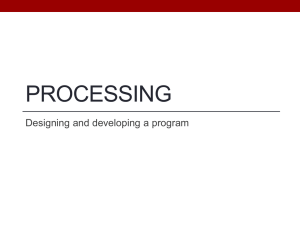Jade Yu Cheng ICS 312 Homework #7 April 11, 2009 Exercise #3
advertisement
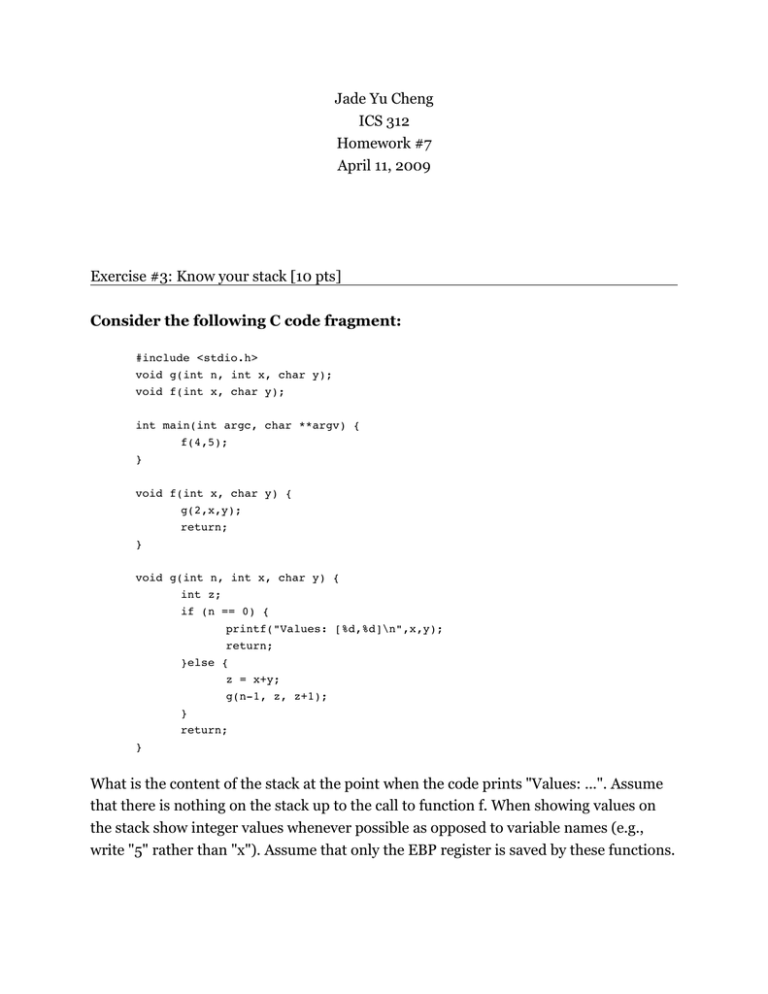
Jade Yu Cheng
ICS 312
Homework #7
April 11, 2009
Exercise #3: Know your stack [10 pts]
Consider the following C code fragment:
#include <stdio.h>
void g(int n, int x, char y);
void f(int x, char y);
int main(int argc, char **argv) {
f(4,5);
}
void f(int x, char y) {
g(2,x,y);
return;
}
void g(int n, int x, char y) {
int z;
if (n == 0) {
printf("Values: [%d,%d]\n",x,y);
return;
}else {
z = x+y;
g(n­1, z, z+1);
}
return;
}
What is the content of the stack at the point when the code prints "Values: ...". Assume
that there is nothing on the stack up to the call to function f. When showing values on
the stack show integer values whenever possible as opposed to variable names (e.g.,
write "5" rather than "x"). Assume that only the EBP register is saved by these functions.
Answer:
%include "asm_io.inc"
segment .data
msg db "Values: ",0 ; the output message
segment .text
global asm_main
asm_main:
push ebp ; setup
mov ebp, esp ; setup
pusha ; setup
push dword 4 ; push the 1st param of f, 4
push dword 5 ; push the 2nd param of f, 5
call f ; call function f
add esp, 8 ; clean up the stack
popa ; clean up
mov eax, 0 ; clean up
mov esp, ebp ; clean up
pop ebp ; clean up
ret ; clean up
;;; Code for function f
f:
push ebp ; setup
mov ebp, esp ; setup
pusha ; setup
push dword 2 ; push the 1st param of g, 2
push dword [ebp + 12] ; push the 2nd param of g, x
push dword [ebp + 8] ; push the 3rd param of g, y
call g ; call function g
add esp, 12 ; clean up the stack
popa ; clean up
mov eax, 0 ; clean up
mov esp, ebp ; clean up
pop ebp ; clean up
ret ; clean up
;;; Code for function g
g:
push ebp ; setup
mov ebp, esp ; setup
pusha ; setup
cmp dword [ebp + 16], 0 ; if n == 0, print and end
je print
mov eax, [ebp + 12] ; sum up x and y
add eax, [ebp + 8] ; and store it in eax
mov ebx, [ebp + 16] ; let ebx = n ­ 1
dec ebx
push ebx ; push the 1st param, n ­ 1
push eax ; push the 2nd param, x + y
inc eax ; let eax = x + y + 1
push eax ; push the 3rd param, x + y + 1 call g ; call function g
add esp, 12 ; clean up stack
jmp g_end
print:
mov eax, msg ; print the message
call print_string
mov eax, 91 ; print [
call print_char
mov eax, [ebp + 12] ; print x
call print_int
mov eax, 44 ; print ,
call print_char
mov eax, [ebp + 8] ; print y
call print_int
mov eax, 93 ; print ]
call print_char
call print_nl ; print a blank line
g_end:
popa ; clean up
mov eax, 0 ; clean up
mov esp, ebp ; clean up
pop ebp ; clean up
ret ; clean up
The assembly code above is converted from the C code given in the question. By
executing this piece of code, I got the following standard output.
yucheng312@navet:~/private/hw7$ make
m
nasm ­f elf hw7_ex3.asm ­o hw7_ex3.o
gcc ­m32 hw7_ex3.o driver.o asm_io.o ­o hw7_ex3
yucheng312@navet:~/private/hw7$ ./hw7_ex3
Values: [19,20]
Contents of the stack are pretty clear when we examine them by looking at the
assembly code. When the code prints “Values: [19, 20]”, the stack looks like:
f's ebp → g1's ebp → g2's ebp → g3's ebp → current esp →
¦ 4
¦ 5
¦ return @ of function f
¦ main's ebp ¦ :
¦ All registers
¦ :
¦ 2
¦ 4
¦ 5
¦ return @ of the 1st function call of g (g1) ¦ f's ebp
¦ :
¦ All registers
¦ :
¦ 1
¦ 9
¦ 10
¦ return @ of the 2nd function call of g (g2) ¦ g1's ebp
¦ :
¦ All registers
¦ :
¦ 0
¦ 19
¦ 20
¦ return @ of the 3rd function call of g (g3)
¦ g2's ebp
¦ :
¦ All registers
¦ :
¦
¦
¦
¦
¦
¦
¦
¦
¦
¦
¦
¦
¦
¦
¦
¦
¦
¦
¦
¦
¦
¦
¦
¦
¦
¦
¦
¦
¦
¦
¦
